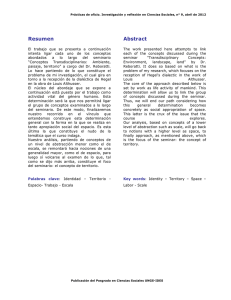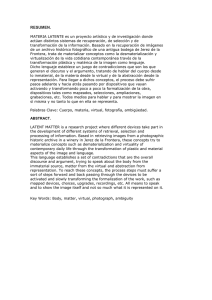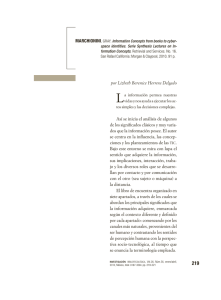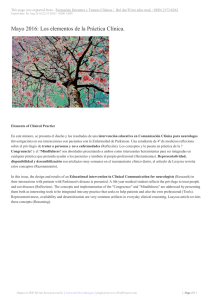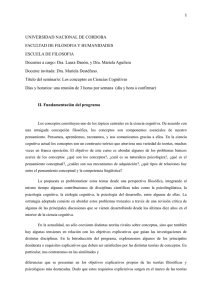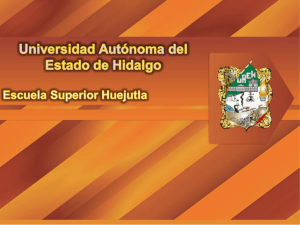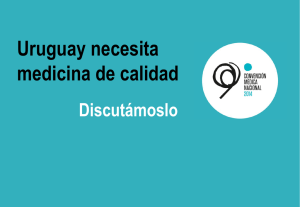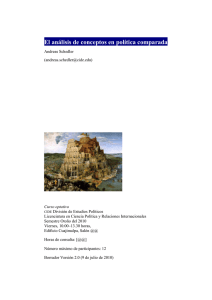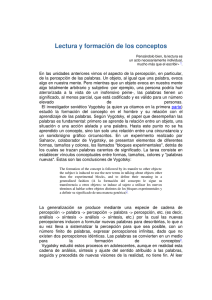Temario - Coordinación de Estudios de Posgrado | UNAM
Anuncio
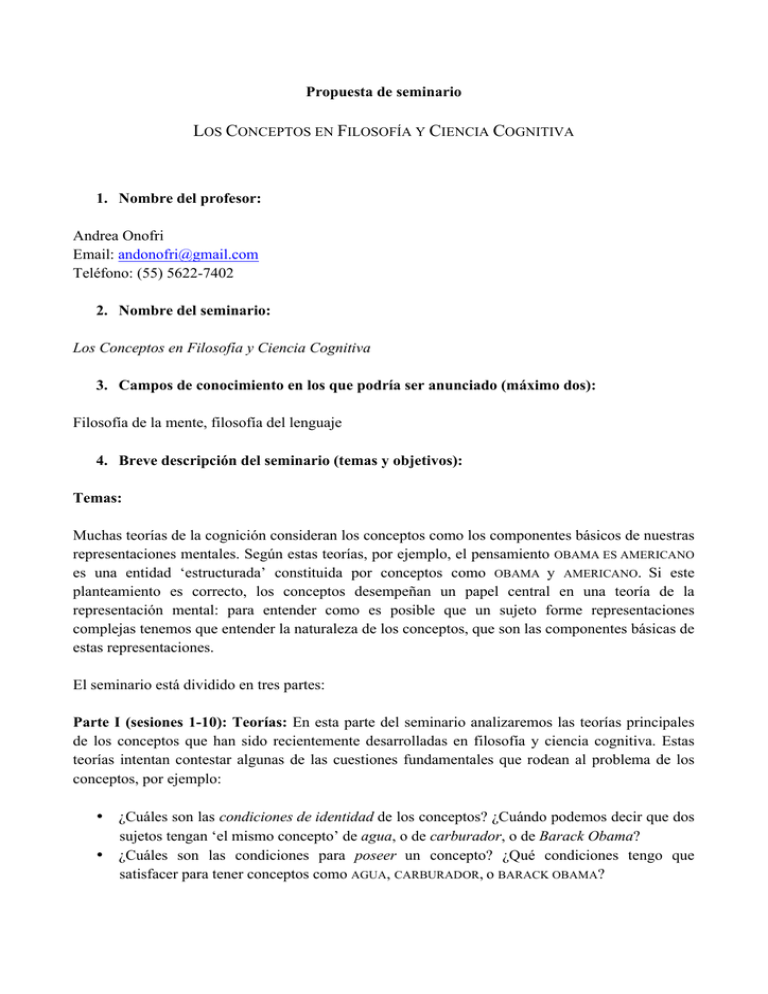
Propuesta de seminario LOS CONCEPTOS EN FILOSOFÍA Y CIENCIA COGNITIVA 1. Nombre del profesor: Andrea Onofri Email: [email protected] Teléfono: (55) 5622-7402 2. Nombre del seminario: Los Conceptos en Filosofía y Ciencia Cognitiva 3. Campos de conocimiento en los que podría ser anunciado (máximo dos): Filosofía de la mente, filosofía del lenguaje 4. Breve descripción del seminario (temas y objetivos): Temas: Muchas teorías de la cognición consideran los conceptos como los componentes básicos de nuestras representaciones mentales. Según estas teorías, por ejemplo, el pensamiento OBAMA ES AMERICANO es una entidad ‘estructurada’ constituida por conceptos como OBAMA y AMERICANO. Si este planteamiento es correcto, los conceptos desempeñan un papel central en una teoría de la representación mental: para entender como es posible que un sujeto forme representaciones complejas tenemos que entender la naturaleza de los conceptos, que son las componentes básicas de estas representaciones. El seminario está dividido en tres partes: Parte I (sesiones 1-10): Teorías: En esta parte del seminario analizaremos las teorías principales de los conceptos que han sido recientemente desarrolladas en filosofía y ciencia cognitiva. Estas teorías intentan contestar algunas de las cuestiones fundamentales que rodean al problema de los conceptos, por ejemplo: • ¿Cuáles son las condiciones de identidad de los conceptos? ¿Cuándo podemos decir que dos sujetos tengan ‘el mismo concepto’ de agua, o de carburador, o de Barack Obama? • ¿Cuáles son las condiciones para poseer un concepto? ¿Qué condiciones tengo que satisfacer para tener conceptos como AGUA, CARBURADOR, o BARACK OBAMA? • ¿Cuál es la naturaleza del contenido de los conceptos? ¿Podemos reducir este contenido a su referencia? Y si el contenido de los conceptos no es puramente referencial, ¿cuál es su estructura? En las partes II-III, nos vamos a enfocar sobre dos problemas específicos. Estos problemas desempeñan un papel primordial en muchos debates contemporáneos en filosofía de la mente y lenguaje, y ambos están profundamente relacionados con el problema de los conceptos. Parte II (sesiones 11-13): Los conceptos como modos de presentación: El primer tema en el que vamos a profundizar es el de los modos de presentación. Esta noción ocupa una posición central en muchas áreas de la filosofía contemporánea. Los modos de presentación (MPs) son frecuentemente usados para resolver algunos puzles tradicionales, como por ejemplo: • Explicar la importancia cognitiva de los enunciados de identidad (“Héspero es Fósforo”). • Explicar el comportamiento de los sujetos que están equivocados sobre la identidad de un objeto o persona (por ejemplo, Lois Lane tiene la creencia falsa de que Clark Kent no es Superman). • Explicar las características de enunciados como “Lois Lane no cree que Clark Kent vuele” Los MPs han sido tradicionalmente identificados con los sentidos Fregueanos, pero esta visión resulta problemática. Para tratar de resolver los problemas con la visión Fregueana muchos autores contemporáneos han ofrecido nuevas teorías sobre la naturaleza de los MPs y los han identificado con los conceptos (entendidos precisamente como algo distinto de los sentidos Fregueanos). En esta parte del seminario veremos si los conceptos pueden desempeñar el papel teórico de los MPs, y si esta identificación nos ayuda resolver los puzles que motivaron la introducción de esta noción. Parte III (sesiones 14-16): Conceptos y análisis conceptual: En la tercera parte vamos a profundizar en un tema fundamental del debate meta-filosófico contemporáneo. Según una importante tradición teórica, el ‘análisis conceptual’ constituye una componente esencial de nuestras practicas filosóficas. Claramente, esta visión está profundamente conectada con el problema de los conceptos. ¿Qué teoría de los conceptos es necesaria para que el análisis conceptual sea posible? Por otro lado, ¿qué visión de los conceptos tienen los que critican esta metodología tradicional? Intentaremos contestar estas preguntas analizando las posiciones de los defensores del análisis conceptual, así como de sus detractores. Objetivo general: Analizar en detalle las principales teorías contemporáneas de los conceptos (parte I) y aplicar estas teorías a dos problemas fundamentales de la filosofía contemporánea (partes II-III). Objetivos particulares: 1) Tener un conocimiento profundo de las teorías y cuestiones que rodean al problema de los conceptos, un asunto central no solo en filosofía de la mente, si no también en muchas otras áreas de la filosofía contemporánea (filosofía del lenguaje, epistemología, meta-filosofía). 2) Entender la metodología y las cuestiones involucradas en el estudio empírico de los conceptos en ciencia cognitiva. 3) Desarrollar la capacidad de escribir un ensayo de 3500-4000 palabras, en el que el estudiante presente su propia tesis y argumente en su defensa con rigor y precisión. Escribir un ensayo de este tamaño requiere una preparación y reflexión profundas sobre los temas del seminario: esto será muy útil para otros cursos y para preparar la tesis de maestría. (NB: el seminario podrá ser en inglés o en español, dependiendo del nivel de inglés de los participantes). 5. Bibliografía (obligatoria y complementaria): Véase calendario abajo: las lecturas obligatorias están marcadas con asterisco (*) 6. Criterios de evaluación: Participación (comentarios) (15%): Antes de cada sesión, todos los estudiantes tendrán que preparar un breve comentario (10-20 líneas) sobre la lectura y enviarlo al profesor. Los comentarios serán la base de la discusión en clase y pueden consistir en dudas, reflexiones u objeciones sobre el texto. Todos los comentarios serán evaluados. Presentación (15%): Cada semana uno de los estudiantes hará una breve presentación de los artículos. Todas las presentaciones serán evaluadas. Plan (20%): Antes de la última sesión cada estudiante deberá enviar un plan (max dos páginas) para su ensayo final. Este plan incluirá un resumen de la tesis principal del ensayo y un esquema detallado de los argumentos principales. Se recomienda discutir el plan con el profesor de antemano. Todos los planes serán evaluados. Ensayo final (50%): Al final del semestre todos los estudiantes deberán enviar un ensayo de 35004000 palabras. El ensayo deberá defender una tesis específica, en relación con uno de los temas del seminario, y argumentar de manera clara a favor de esta tesis. El estudiante deberá ofrecer sus propios argumentos a favor de la tesis principal (no será suficiente resumir los argumentos de las lecturas). Todos los ensayos serán evaluados. 7. Propuesta de día y horario: Lunes 14-18 8. Sede: IIFs Calendario sesiones (tentativo) Sesión 1 Introducción al seminario; la teoría clásica Lecturas: • • • • • • Laurence, S. y Margolis, E. (2003), “Concepts”, pp. 190-205 (*) Laurence, S. y Margolis, E. (2011), “Concepts”, secciones: 1, 2.5, 3, 5 (*) Laurence, S. y Margolis, E. (1999), “Concepts and Cognitive Science”, pp. 8-27 (*) Machery, E. (2009), Doing Without Concepts, sección 4.1 Fodor, J. A. (1998), Concepts: Where Cognitive Science Went Wrong, capítulos 3-4 Katz, J. (1997), “Analyticity, Necessity and the Epistemology of Semantics” Sesión 2 La teoría de los prototipos Lecturas: • • • • • • Laurence, S. y Margolis, E. (1999), “Concepts and Cognitive Science”, sección 3 (*) Fodor, J. A. (1998), Concepts: Where Cognitive Science Went Wrong, capítulo 5 (*) Machery, E. (2009), Doing Without Concepts, secciones 4.2-4.3 Robbins, P. (2002), “How to Blunt the Sword of Compositionality” Hampton, J. (2000), “Concepts and Prototypes” Rey, G. (1983), “Concepts and Stereotypes” Sesión 3 La ‘Teoría-Teoría’ Lecturas: • • • • • • Laurence, S. y Margolis, E. (1999), “Concepts and Cognitive Science”, sección 4 (*) Machery, E. (2009), Doing Without Concepts, secciones 4.4.1-4.4.3 (*) Carey, S. (2009), The Origin of Concepts, capítulo 1 (*) Murphy, G. y Medin, D. (1985), “The Role of Theories in Conceptual Coherence” Carey, S. (1991), “Knowledge Acquisition: Enrichment or Conceptual Change?” Fodor, J. A. (1998), Concepts: Where Cognitive Science Went Wrong, sección 5B Sesión 4 Teorías inferencialistas Lecturas: • • • • • • Schneider, S. (2009), “The Nature of Symbols in the Language of Thought” (*) Peacocke, C. (1998), “Implicit Conceptions, Understanding and Rationality” (*) Block, N. (1993), “Holism, Hyper-analyticity and Hyper-compositionality” Schneider, S. (2011), The Language of Thought: A New Philosophical Direction, capítulo 6 Peacocke, C. (1992), A Study of Concepts, capítulo 1 (extractos) Margolis, E. (1998), “Implicit Conceptions and the Phenomenon of Abandoned Principles” Sesión 5 El atomismo conceptual Lecturas: • • • • • Laurence, S. y Margolis, E. (1999), “Concepts and Cognitive Science”, sección 6 (*) Prinz, J. (2002), Furnishing the Mind, capítulo 4 sección 4.2 (*) Fodor, J. A. (2008), LOT 2: The Language of Thought Revisited, capítulo 3 (*) Aydede, M. (1998), “Fodor on Concepts and Frege Puzzles” Fodor, J. A. (1998), Concepts: Where Cognitive Science Went Wrong, capítulos 1-2 Sesión 6 El problema del nativismo Lecturas: • Laurence, S. y Margolis, E. (2011), “Learning Matters: The Role of Learning in Concept Acquisition” (*) • Carey, S. (2009), The Origin of Concepts, pp. 475-84 y 508-23 (*) • Gross, S. y Rey, G. (forthcoming), “Innateness” • Margolis, E. (1999), “How to Acquire a Concept” • Laurence, S. y Margolis, E. (2008) “How to Learn the Natural Numbers: Inductive Inference and the Acquisition of Number Concepts” • Fodor, J. A. (2008), LOT 2: The Language of Thought Revisited, capítulo 5 Sesión 7 La teoría de los ‘proxytypes’ Lecturas: • • • • Prinz, J. (2002), Furnishing the Mind, capítulo 6 (*) Rice, C. (2013), “Concept Empiricism, Content, and Compositionality” (*) Prinz, J. (2002), Furnishing the Mind, capítulos 5, 7, 11 Weiskopf, D. (2007), “Concept Empiricism and the Vehicles of Thought” Sesión 8 Pluralismo y eliminativismo Lecturas: • • • • • Machery, E. (2009), Doing Without Concepts, capítulos 6 y 8 (*) Weiskopf, D. (2009), “Atomism, Pluralism, and Conceptual Content” (*) Malt, B. (2010), “Why We Should Do Without Concepts” Laurence, S. y Margolis, E. (2010), “Concepts and Theoretical Unification” Piccinini, G. (forthcoming), “Two Kinds of Concept: Implicit and Explicit” Sesión 9 El originalismo Lecturas: • Sainsbury, R. M. y Tye, M. (2011), “An Originalist Theory of Concepts” (*) • Sainsbury, R. M. y Tye, M. (2012), Seven Puzzles of Thought and How to Solve Them: an Originalist Theory of Concepts, capítulos 1 y 7 (*) • Millikan, R. (2011), “Loosing the Word-Concept Tie” Sesión 10 Ficheros mentales Lecturas: • • • • Recanati, F. (2012), Mental Files, capítulos 3-4 (*) Scholl, B. (2001), “Objects and Attention: The State of the Art” (*) Recanati, F. (2010), “Singular Thought: In Defense of Acquaintance” Carey, S. (2009), The Origin of Concepts, capítulo 3 Sesión 11 Los modos de presentación: introducción Lecturas: • Dickie, I. y Rattan, G. (2010), “Sense, Communication and Rational Engagement” (*) • Recanati, F. (2012), Mental Files, capítulos 5-7 (*) • Crimmins, M. y Perry, J. (1989), “The Prince and the Phone Booth: Reporting Puzzling Beliefs” • Braun, D. (1998), “Understanding Belief Reports” • Frege, G. (1892/1980), “On Sense and Reference” Sesión 12 Los modos de presentación: el problema de la individuación Lecturas: • • • • • Crimmins, M. (1992), Talk about Beliefs, pp. 35-53 (*) Loar, B. (1988), “Social Content and Psychological Content” (*) Heck, R. (1995), “The Sense of Communication” Heck, R. (2002), “Do Demonstratives Have Senses?” Laurence, S. y Margolis, E. (2007), “The Ontology of Concepts – Abstract Objects or Mental Representations?”, sección 9 Sesión 13 Escepticismo sobre los modos de presentación Lecturas: • • • • • Millikan, R. (1997), “Images of Identity” (*) Onofri, A. (ms.), “What Concept Sameness Cannot Do” (*) Fine, K. (2007), Semantic Relationism, capítulo 3 Schiffer, S. (1990), “The Mode-Of-Presentation Problem” Millikan, R. (1998), “A Common Structure for Concepts of Individuals, Stuffs, and Kinds: More Mama, More Milk, and More Mouse” Sesión 14 El análisis conceptual Lecturas: • Jackson, F. (1998), From Metaphysics to Ethics: A Defense of Conceptual Analysis, capítulo 2 (*) • Weatherson, B. (2003), “What Good Are Counterexamples?” (*) • Ramsey, W. (1998), “Prototypes and Conceptual Analysis” • Schroeter, L. (2004), “The Limits of Conceptual Analysis” • Goldman, A. (2007), “Philosophical Intuitions: Their Target, Their Source, and Their Epistemic Status” • Kornblith, H. (2007), “Naturalism and Intuitions” Sesión 15 Reto n. I: Filosofía experimental Lecturas: • Weinberg, J. et al. (2001), “Normativity and Epistemic Intuitions” (*) • Knobe, J. (2003) “Intentional Action in Folk Psychology: An Experimental Investigation” (*) • Machery, E. et al. (2004), “Semantics, Cross-Cultural Style” • Sosa, E. (2007), “Experimental Philosophy and Philosophical Intuition” • Nagel, J. (2012), “Intuitions and Experiments: A Defense of the Case Method in Epistemology” Sesión 16 Reto n. II: ¿Hay verdades analíticas? Lecturas: • • • • • • Williamson, T. (2007), The Philosophy of Philosophy, capítulos 3-4 (*) Boghossian, P. (2003), “Blind Reasoning” Boghossian, P. (2011), “Williamson on the A Priori and the Analytic” Laurence, S. y Margolis, E. (2001), “Boghossian on Analyticity” Block, N. y Stalnaker, R. (1999), “Conceptual Analysis, Dualism, and the Explanatory Gap” Quine, W. V. O. (1953), “Two Dogmas of Empiricism” Bibliografía Aydede, M. (1998), “Fodor on Concepts and Frege Puzzles”, Pacific Philosophical Quarterly 79 (4), pp. 289-294. Block, N. (1993), “Holism, Hyper-Analyticity and Hyper-Compositionality”, Philosophical Issues 3, pp. 37-72. Block, N. & Stalnaker, R. (1999), “Conceptual Analysis, Dualism, and the Explanatory Gap”, Philosophical Review 108 (1), pp. 1-46. Boghossian, P. (2003), “Blind Reasoning”, Aristotelian Society Supplementary Volume 77 (1), pp. 225–248 Boghossian, P. (2011), “Williamson on the A Priori and the Analytic”, Philosophy and Phenomenological Research 82 (2), pp. 488-497. Braun, D. (1998), “Understanding Belief Reports”, Philosophical Review 10 (7), pp. 555-595. Carey, S. (1991), “Knowledge acquisition: enrichment or conceptual change?” in E. Margolis & S. Laurence (eds.), Concepts: Core Readings, MIT Press. Carey, S. (2009), The Origin of Concepts, Oxford University Press. Crimmins, M. (1992), Talk About Beliefs, Cambridge, MA: MIT Press. Crimmins, M. and Perry, J. (1989), “The Prince and the Phone Booth: Reporting Puzzling Beliefs”, Journal of Philosophy 86 (12), pp. 685 - 711. Davis, W. (2005), “Concept Individuation, Possession Conditions, and Propositional Attitudes”, Noûs 39 (1), pp. 140-66. Dickie, I. and Rattan, G. (2010), “Sense, Communication and Rational Engagement”, Dialectica 64 (2), pp. 131-51. Fine, K. (2007), Semantic Relationism, Oxford: Blackwell. Fodor, J. A. (1998), Concepts: Where Cognitive Science Went Wrong, Oxford: Oxford University Press. Fodor, J. A. (2008), LOT 2: The Language of Thought Revisited, New York: Oxford University Press. Frege, G. (1892/1980), “On Sense and Reference”, in Translations from the Philosophical Writings of Gottlob Frege, P. Geach and M. Black (eds. and trans.), Oxford: Blackwell. Goldman, A. (2007), “Philosophical Intuitions: Their Target, Their Source, and Their Epistemic Status”, Grazer Philosophische Studien 74, pp. 1-­‐‑26. Gross, S. & Rey, G. (forthcoming), “Innateness”, in Eric Margolis, Richard Samuels & Stephen Stich (eds.), Oxford Handbook of Philosophy of Cognitive Science, Oxford University Press. Hampton, J. (2000), “Concepts and Prototypes”, Mind and Language 15 (2-3), pp. 299-307. Heck, R. (1995), ‘The Sense of Communication’, Mind 104, pp. 79–106. Heck, R. (2002), ‘Do Demonstratives Have Senses?’, Philosopher’s Imprint 2, pp. 1–33. Jackson, F. (1998), From Metaphysics to Ethics: A Defense of Conceptual Analysis, Oxford University Press. Katz, J. (1997), “Analyticity, Necessity and the Epistemology of Semantics”, Philosophy and Phenomenological Research LVII, pp. 1-28 Knobe, J. (2003) “Intentional Action in Folk Psychology: An Experimental Investigation”, Philosophical Psychology 16 (2), pp. 309-325 Kornblith, H. (2007), “Naturalism and Intuitions”, Grazer Philosophische Studien 74 (1), pp. 27-49. Laurence, S. and Margolis, E. (1999), “Concepts and Cognitive Science”, in E. Margolis & S. Laurence (eds.), Concepts: Core Readings, MIT Press. Laurence, S. and Margolis, E. (eds.) (1999), Concepts: Core Readings, MIT Press. Laurence, S. and Margolis, E. (2001), “Boghossian on Analyticity”, Analysis 61 (4), pp. 293–302. Laurence, S. and Margolis, E. (2003), “Concepts”, in The Blackwell Guide to the Philosophy of Mind, Blackwell. Laurence, S. and Margolis, E. (2007), “The Ontology of Concepts – Abstract Objects or Mental Representations?”, Noûs 41 (4), pp. 561-593. Laurence, S. and Margolis, E. (2008) “How to Learn the Natural Numbers: Inductive Inference and the Acquisition of Number Concepts”, Cognition 106. Laurence, S. and Margolis, E. (2010), “Concepts and Theoretical Unification”, Behavioral and Brain Sciences 33 (2-3), pp. 219-220. Laurence, S. and Margolis, E. (2011), “Concepts”, in The Stanford Encyclopedia of Philosophy, URL: http://plato.stanford.edu/archives/fall2012/entries/concepts/ Laurence, S. and Margolis, E. (2011), “Learning Matters: The Role of Learning in Concept Acquisition”, Mind and Language 26 (5), pp. 507-539. Loar, B. (1988), “Social Content and Psychological Content”, in Robert H. Grimm & D. D. Merrill (eds.), Contents of Thought. University of Arizona Press. Machery, E. (2009), Doing Without Concepts, New York: Oxford University Press. Machery, E. et al. (2004), “Semantics, cross-cultural style”, Cognition 92 (3). Malt, B. (2010), “Why We Should Do Without Concepts”, Mind and Language 25 (5), pp. 622-633. Margolis, E. (1998), “Implicit Conceptions Principles”, Philosophical Issues 9, pp. 105-114. and the Phenomenon of Abandoned Millikan, R. (2011), “Loosing the Word–Concept Tie”, Aristotelian Society Supplementary Volume 85 (1), pp. 125-143. Millikan, R. (1997), “Images of Identity”, Mind 106 (423), pp. 499-519. Millikan, R. (1998), “A Common Structure for Concepts of Individuals, Stuffs, and Kinds: More Mama, More Milk, and More Mouse”, Behavioral and Brain Sciences 21 (1), pp. 55-65. Murphy, G. and Medin, D. (1985), “The Role of Theories in Conceptual Coherence”, in E. Margolis & S. Laurence (eds.), Concepts: Core Readings, MIT Press. Nagel, J. (2012), “Intuitions and Experiments: A Defense of the Case Method in Epistemology”, Philosophy and Phenomenological Research 85 (3), pp. 495-527. Onofri, A. (ms.), “What Concept Sameness Cannot Do” Peacocke, C. (1992), A Study of Concepts, MIT Press. Peacocke, C. (1998), “Implicit Conceptions, Understanding and Rationality”, Philosophical Issues 9, pp. 43-88. Perry, J. (2000), The Problem of the Essential Indexical and Other Essays, 2nd ed., Stanford: CSLI Publications. Piccinini. G. (forthcoming), “Two Kinds of Concept: Implicit and Explicit”, Dialogue. Prinz, J. (2002), Furnishing the Mind, Cambridge, MA: MIT Press. Ramsey, W. (1998), “Prototypes and Conceptual Analysis”, in M. R. DePaul & William Ramsey (eds.), Rethinking Intuition, Lanham: Rowman and Littlefield Recanati, F. (2010), “Singular Thought: In Defense of Acquaintance”, in Jeshion, R. (ed.) New Essays on Singular Thought, Oxford University Press. Recanati, F. (2012), Mental Files, Oxford University Press. Rey, G. (1983), “Concepts and Stereotypes” in E. Margolis & S. Laurence (eds.), Concepts: Core Readings, MIT Press. Rice, C. (2013), “Concept Empiricism, Content, and Compositionality”, Philosophical Studies 162 (3), pp. 567-583. Robbins, P. (2002), “How to Blunt the Sword of Compositionality”, Noûs 36 (2), pp. 313-334. Sainsbury, R. M. and Tye, M. (2011), “An Originalist Theory Of Concepts”, Proceedings of the Aristotelian Society Supplementary Volume LXXXV, pp. 101-124. Sainsbury, R. M. and Tye, M. (2012), Seven Puzzles of Thought and How to Solve Them: an Originalist Theory of Concepts, Oxford University Press. Schiffer, S. (1990), “The Mode-of-Presentation Problem”, in C. Anderson & J. Owens (eds.), Propositional Attitudes, Stanford: CSLI. Schneider, S. (2009), “The Nature of Symbols in the Language of Thought”, Mind and Language 24, pp. 523-553. Schneider, S. (2011), The Language Of Thought: A New Philosophical Direction, Harvard: MIT Press. Scholl, B. (2001), “Objects and Attention: The State of the Art”, Cognition 80, pp. 1-46. Schroeter, L. (2004), “The Limits of Conceptual Analysis”, Pacific Philosophical Quarterly 85 (4), pp. 425-453. Sosa, E. (2007), “Experimental Philosophy and Philosophical Intuition”, Philosophical Studies, 132 (1), pp. 99-107. Weatherson, B. (2003), “What Good Are Counterexamples?”, Philosophical Studies 115, pp. 1-­‐‑31. Weinberg, J. et al. (2001), “Normativity and Epistemic Intuitions”, Philosophical Topics, 29 (1-2), pp. 429-460. Weiskopf, D. (2007), “Concept Empiricism and the Vehicles of Thought”, Journal of Consciousness Studies 14 (s 9-10), pp. 156-183 Weiskopf, D. (2009), “Atomism, Pluralism, and Conceptual Content”, Philosophy and Phenomenological Research 79, pp. 130–162. Williamson, T. (2007), The Philosophy of Philosophy, Oxford University Press.
